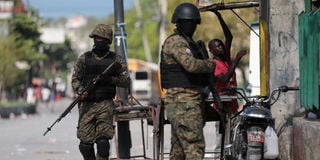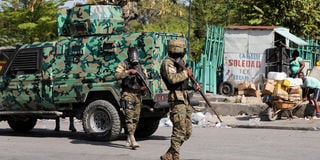Premium
Why Haiti's extended state of emergency worries Kenyan authorities

Police officers patrol as Haiti remains in state of emergency due to the violence, in Port-au-Prince, Haiti March 9, 2024.
What you need to know:
- The notice banned people from travelling by any means within the West Zone.
- Gangs have been accused of involvement in the murder of peaceful Haitian citizens.
The deployment of Kenyan police officers to Haiti remains uncertain after the Caribbean country extended the state of emergency in the entire West Department for the next month.
Over the weekend, the Haitian government published details of the state of emergency in the Journal le Moniteur - a replica of Kenya's official gazette - which citizens of the Caribbean country should strictly follow until April 3, 2024.
"The state of security emergency is declared throughout the Western Department for a period of one (1) month. The authorities are authorised to take the necessary measures to restore normal life, in accordance with the provisions of the state of emergency," the proclamation reads.
The notice banned people from travelling by any means within the West Zone, but exempted law enforcement officers on duty, firefighters, paramedics, health workers and duly identified journalists.
It also stated that the move to extend the state of emergency was due to the alarming number of armed individuals across the country committing criminal and terrorist acts.
As a result, Interior Ministry officials are expected to review the situation this week before the deployment.
The gangs have been accused of involvement in the murder of peaceful citizens and violence against women and children.
Other allegations levelled against the gangs include causing massive population displacements, preventing free movement of people and kidnappings for ransom.
The state also announced that on the night of March 2 and 3, there were serious attacks orchestrated by the gangs leading to the escape of prisoners from the country's two largest prisons.
The country has been struggling to put an end to the deteriorating security situation, even as the attacks pose a threat that could plunge the country intoto civil war and possible genocide.
This comes at a time when Haitian Prime Minister Ariel Henry is struggling to stay in power.
The Prime Minister is yet to return to the country following his trip to Kenya with the gangs having caused the closure of the country's main international airport.
The United States is also pressing Mr Henry to pave the way for the election of a new head of state, which is due to take place in 2021.
Another key figure calling for the embattled prime minister to step down is former coup leader Guy Philippe, who has declared his interest in the presidency of Haiti.
Philippe led a coup in Haiti in 2004. He was later indicted and imprisoned in the US and released in 2023.
Speaking to the Nation on Sunday, Mr Gedeon Jean, who heads the Centre for Analysis and Research in Human Rights (CARDH) in Haiti, said the situation was worsening.
Mr Jean, who had visited Haiti three months ago, told the Nation that Haitians appreciated the contribution Kenya was making, especially in agreeing to deploy police officers in the country.

Police officers patrol as Haiti remains in state of emergency due to the violence, in Port-au-Prince, Haiti March 9, 2024.
"The situation in Haiti has deteriorated exponentially. Today, the capital is under the control of gangs. The critical infrastructure of the state is under attack and the police are absent," he said, adding that airports, police stations and prisons are currently controlled by gangs.
Mr Jean further said police officers in the Caribbean country had become victims of kidnapping, rape and murder.
He said it was necessary to use proportional force with the necessary material and technological means to prevent the worsening of the situation in the coming days.
He also said the country needs a force capable of assisting the Haitian National Police in carrying out operations to protect the population and infrastructure of the Caribbean nation, adding that the proposed deployment of 1,000 Kenyan policemen would not be sufficient.
The secretary of the Haitian National Police Union (SPNH-17), Mr Jean Baptiste, in an exclusive interview with the Nation, said the police bosses in Haiti should be thrown out with immediate effect.
"There must be a change of leadership within the Haitian National Police, denouncing the alleged incompetence of the top leadership," he said.
Mr Baptiste said they were calling for the appointment of an operational and dynamic Director General who would be able to restore the confidence of the police and also put in place an effective plan to combat insecurity.
He expressed fear that many lives could be lost.
"More than 10 police stations and two detention centres have been attacked, resulting in the escape of more than 5,000 prisoners," he said.
"The population is almost left to its own devices, with political leaders seemingly absent and police forces disarmed and powerless in the face of increasing violence," he added.
Mr Baptiste also said police officers in Haiti should be provided with heavy equipment, weapons, ammunition, bulletproof vests and ballistic helmets, which they currently lack.
He said the security problem in Haiti is not a question of the number of police officers.
"We would be delighted to have the support of our African brothers, but in this situation, the international policy behind it will not help solve the problem," he said.
Meanwhile, the exact date on which the National Police Service (NPS) officers will leave the country remains unknown, although President William Ruto said the government was ready to deploy them.
This was even after powerful gang leader Jimmy 'Barbeque' Cherizier warned Kenyan officers not to set foot in Haiti.





